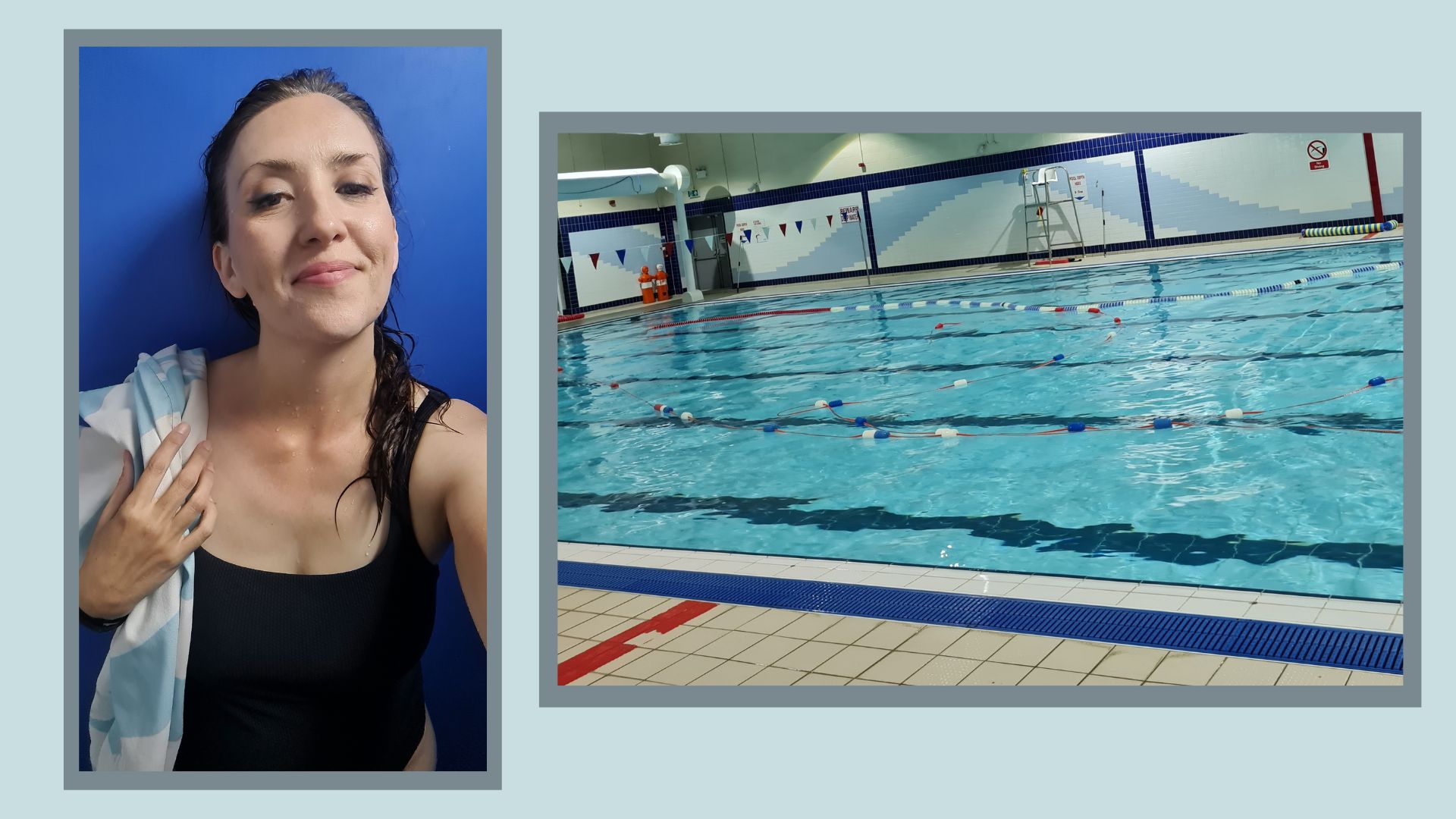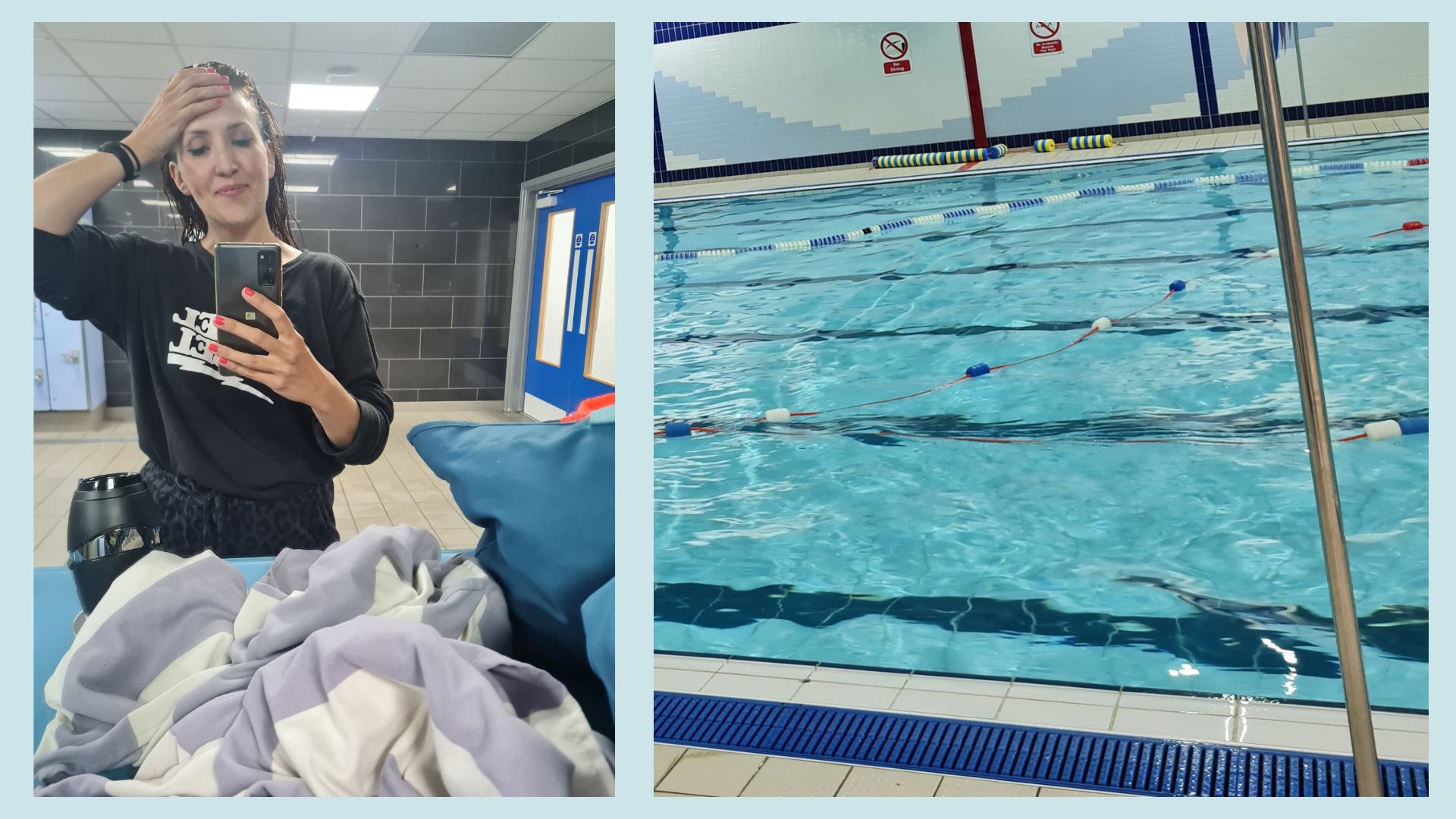
But what are the benefits of swimming everyday? With summer on the way, Health Writer Kerry Law took to the pool to find out.
Around 4.7 million people swim twice or more every month, making swimming as a workout the fifth most popular cardio activity in the UK, per data from Sport England. However, many of us still see swimming as a holiday-exclusive activity, one reserved for hotel swimming pools and seas much warmer than those in this country.
I have to admit that I was one of these people. I used to swim regularly, but the habit dropped by the wayside as I introduced more convenient workouts into my life like pre-work runs and strength training at the gym. I have to navigate my weekly work deadlines, family responsibilities, lack of sleep, and 'lidmin' (life admin) before even contemplating a swim at my local pool.
But recently, when I achieved all these tasks, I did manage to make time for a dip - and I was reminded of how much I enjoyed it. So, instead of keeping swimming in the margins of my workout schedule, I put it front and centre of my exercise plan for two weeks to see the potential benefits of swimming every day.
Benefits of swimming every day
1. Swimming can help you develop a toned body
“Swimming is a great way of improving muscular endurance and producing a lean, toned physique,” says Sam Quinn, a level 3 personal trainer and lead at Nuffield Health. “The four main strokes - freestyle, breaststroke, butterfly and backstroke – all require the whole body to work simultaneously, using high energy outputs from the muscles whilst burning lots of calories.”
I love a good stretch (the yoga mat is my happy place), so it felt good to reach long into each stroke, knowing this boosted the benefit of my swim. Whether front crawl, breaststroke or the occasional backstroke (I can’t even attempt butterfly), there wasn’t a stroke where I didn’t feel a stretch in the shoulders, biceps, core, glutes, hips and calves.
As the water acts as a resistance, just like bands or light dumbbells would, it can be a great introduction to strength training for anyone new to the activity and looking to build or maintain muscle.
Sign up to our free daily email for the latest royal and entertainment news, interesting opinion, expert advice on styling and beauty trends, and no-nonsense guides to the health and wellness questions you want answered.
The water also acts as a support, so you can shift the effort into your lower body to work your glutes (buttocks) and legs if you want to, so it's not just an upper-body workout.
After just a few days of swimming, I felt the difference, particularly after my regular gym workout. The swim helped with my recovery, but also showed which of my muscles were working when I woke up feeling a little sore (in a good way) the following day.
2. Swimming can reduce stress and boost mood
Swimming is well-known for being good for our mental health. A poll by Swim England found the sport had reduced symptoms of anxiety or depression for 1.4 million adults in Britain, with many swimmers saying it made them feel happier and more motivated.
But what elevates swimming above your standard endorphin-boosting exercise could be the watery environment itself. As reported by the BBC, a growing body of research suggests exposure to ‘blue space’ (pools, lakes, the sea) positively impacts our mental wellbeing. Being in or near water increases happy hormone levels (dopamine and oxytocin) and lowers cortisol levels (the stress hormone). This creates a Zen-like calm dubbed the ‘blue mind’ state.
‘Blue mind’, a term first coined by Dr Wallace J Nichols in his book of the same name, describes the mildly meditative state we can experience when swimming, floating, paddling or even simply gazing at the water. Scientists are not sure as to why water has such a powerful effect on our psyche, but theories suggest it may be down to our bodies being mostly water. We are syncing, on a primal level, with our environment.
While 'blue mind' theory normally applies to wild swimming and is often listed among the benefits of cold water swimming, I felt similar benefits stepping into the pool every evening. During every swim, I spent the first 10 minutes just indulging in the moving meditation, not counting laps or monitoring my technique.
I noticed how the water felt as I glided through it, how it sounded as I splashed and blew out bubbles, how the light reflected off the tiles, and even how the chlorine smelled and tasted on my lips. Coming out of the pool, I felt calm.

Kerry went swimming every day for two weeks in the evenings.
3. Swimming may improve sleep quality
With its ultra-calming, ‘blue mind’ qualities, it follows that swimming could also help you get a better night’s sleep. Inez Griffin, a senior health and wellbeing physiologist with an MSc in Sport and Exercise Science, who works with Nuffield Health, says: “We know that daily exercise can help us sleep better, but it’s important to consider what time of day we’re exercising, and how vigorously.
“High-intensity exercise can cause increased adrenaline levels, heart rate, and body temperature, which isn’t ideal right before bedtime. A light to moderate-intensity swim could be a good exercise choice in the evening, but you should consider how far and fast you swim, and which stroke you choose. Try a stroke you find easier and swim comfortably to help keep it relaxing,” she suggests.
I kept pace and intensity fairly slow when I swam after 9 pm. I stuck to an easy front crawl, mixing it with slower laps in the breaststroke to avoid spikes in my heart rate and help dial down the cortisol. The ritual of the post-swim shower and changing into comfy loungewear suited the pre-bedtime routine.
However, when it came to improving the quality of my sleep, my Fitbit (taken with a pinch of salt as even the best Fitbits and other trackers lack complete accuracy) told me my nightly swims didn't impact the length or quality of my sleep. Longer periods of deep sleep still alluded me, but sleep quality wasn't worse. In hindsight, perhaps I offset any potential sleep benefits of swimming every day by looking at my stats and social media much later in the night, having spent the early evening in the pool. Oops.
4. Swimming can help with weight loss
As with any aerobic activity, it’s no surprise that swimming is an effective calorie burner. How many calories swimming burns will differ for every person but Harvard Medical School estimates that during a 30-minute low-intensity swim a 57kg woman can burn around 180 calories, a number that rises with body weight as an 84kg woman could burn 266 calories in the same session.
Switch it to a vigorous 30-minute swim using front crawl over breaststroke, and the same women could burn around 300 and 444 calories, respectively. It's not as intense as HIIT or running, which is where running wins in the swimming vs running debate, but it's decent. To lose weight, you would still need to pair it with a calorie deficit over several weeks. This was something my two-week-long swim challenge didn't allow for.
As I was swimming in the evenings and keeping the intensity low, my calorie burn was on the lower end of the scale. But, it still proved a much better replacement for what I would usually do around the same time - sitting on the sofa at home, scrolling on my phone.
Adding aerobic exercise to my evening routine, an otherwise fairly inactive period, meant I hit my calorie burn target every day, per my Fitbit. This surprised me as I usually hit it four or five days out of seven (due to rest days), and during my swimming fortnight, I even skipped a couple of gym sessions to make time for the pool.
5. Swimming is good for your joints and your posture
The supportive nature of water means that swimming is the kind of exercise you can do on an active rest day or if you have an injury. Jonathan Kibble, the head of exercise and physical activity at Vitality, says: “As swimming is low impact compared to running, for example, it’s a great way to elevate your heart rate and improve your fitness, without putting lots of pressure on your joints. This is great if you have pre-existing injuries or want a gentler workout."
He also says: "Swimming can be a great way to help alleviate any problems around the neck and shoulders. So many of us spend time hunched over at our desks, and studies [by the University of Applied Sciences Wiener Neustadt and others] have shown that swimming regularly strengthens the muscles around these areas, helping to improve your posture."
I welcomed the opportunity to offset the hours spent working at my laptop, stretching out by swimming every day.
6. Swimming can boost stamina and endurance
I’m not one for long, marathon-level exercise, but I would like more stamina. I tried to keep moving in the pool, maintaining a constant, steady flow to meet my minimum target of one kilometre (40 lengths in my 25m pool) without feeling out of breath.
Time and effort are key to improving stamina and endurance, though, says Quinn, so my efforts to swim every day put me on the right path. “You need to practice your technique so regular swim sessions will be beneficial for new swimmers to achieve cardiovascular adaptation before moving on to higher intensities or longer durations," he says.
Aside from a couple of evenings of interrupted flow (in a public pool, you have to accept you won’t always have the luxury of a lane to yourself), I found myself swimming further, more easily as the weeks of swimming every day progressed. Pacing my breathing with my strokes helped leave me with fewer ‘out of breath’ moments. Studies from the University of Belgrade have also shown that swimming is great for increasing lung capacity and efficiency – something that will benefit me in other types of exercise.
As Quinn explains, being able to swim further for longer requires practice, so while my ‘swim weeks’ were too short to see noticeable improvements, I feel I’m heading in the right direction.
The bottom line
I certainly enjoyed indulging my love of swimming every day (mood booster? Tick!). However, I must admit that collapsing on the sofa seemed more tempting on a couple of evenings. Outside of the workout itself, simply “going swimming” takes effort and, much like any other kind of exercise, getting out of the door is the hardest part about swimming every day.
But every time I got into the water, I forgot about that. The pool environment is a very immersive experience, so it helps you get into a different headspace than when you’re at home or in a regular fitness class. It also meant I spent at least an hour or more completely screen-free during the evening. As we know, blue light-emitting devices disrupt our sleep patterns, so this can only be a good thing.
While I didn't experience any magic changes in my sleep routine, my fortnight of swimming every day was hugely positive. It reminded me to make more time for this water-based exercise that I love. It's also so complementary to my fitness routine. Sometimes the best workouts are those where you feel most at home – and for me, that’s swimming.
But if I go swimming more often, I need to learn from my final observation – a daily dunking in chlorine means I also have to invest in some intensive moisturisers for my hair and skin.

A new hobby requires new kit, right? Luckily, this sporty swimming costume from Speedo, one of the best swimsuit brands, doesn't break the bank. It has a wide underband for comfort, crossover straps for a flattering fit, and underbust mesh inserts for support. It's also chlorine resistant, making it more durable.

If you have a larger bust, it's a good idea to invest in a swimsuit with built-in support. The Seville Swimsuit by Bravissimo has hidden underwire for support, a higher neckline for coverage, and a flattering fit, with a sporty design that's versatile enough for the pool and your next beach holiday.

While pricey, the Color Wow Dream Filter Treatment is a pre-treatment shampoo designed to clear impurities from hard water from your hair, such as iron and calcium - and if you read the small print, it works for chlorine too. Ideal for blonde or coloured hair.
Is 30 minutes of swimming a day enough?
Yes, 30 minutes of swimming every day is more than enough to see benefits for your cardiovascular health, boost muscle, and improve brain health, especially if you're new to swimming workouts.
The NHS and other health bodies recommend 150 minutes of moderate intensity exercise every week, so you only need to swim for 30 minutes, five times per week, to reap the benefits.
However, a study by the University of Otago shows that even 20 minutes of swimming can make a difference, with researchers finding that this shorter session boosted participants' brain function. So, whether you can swim for 20 minutes or an hour, every session helps.
Is it okay to swim every day?
Yes, it will be perfectly fine for many people to swim every day. As the experts say, consistency and regularity are key to seeing changes in cardiovascular health and physical fitness. That being said, I did experience some soreness after my days on end of swimming, so be prepared for this.
Also, the logistics of swimming every day aren't to be underestimated. Travelling to the pool, changing in and out of swimwear, constantly having to rinse chlorine from my hair and costume - it's all very time-consuming. So, while in theory it's perfectly fine to swim every day, if you don't have the time to spend with the set-up, don't stress yourself making it a goal to swim every day.

Sam Quinn is a qualified Level 3 personal trainer at Nuffield Health Devonshire and the personal training lead at Nuffield Health. He has over 10 years of one-on-one coaching experience and previously, she spent eight years working with the elite swimming programme for Plymouth Leander swim team, one of Britain's leading competitive swimming clubs, achieving Olympic Gold in the 2012 Olympics, World, European and Commonwealth Championship titles.

Inez Griffin is the senior health and wellbeing physiologist at Bournemouth Nuffield Health Hospital. She has worked in preventative healthcare for five years within both clinical and community settings, with her current role involving delivering health assessments and helping clients optimise their health.
Inez is also an ex-national level swimmer who competed for over 10 years.

With a background in sports science and experience as a personal trainer, Jonathan takes his knowledge from the health and fitness industry and applies it to improving the health of Vitality members.

Kerry is a freelance writer covering health, fitness and wellbeing. With bylines in several national publications alongside woman&home - including Stylist, Red, Metro, Good Housekeeping and more. She has written about the latest news and trends in exercise, nutrition, mental wellbeing, alternative health, ecotherapy, health tech, relationships...in fact, anything that impacts our bodies and minds. Outside of work, she can be found doing her most important job (parenting) while trying to squeeze in time for exercise and escaping into nature whenever possible.
